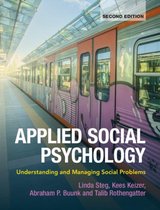Samenvatting
Samenvatting Applied Social Psychology, ISBN: 9781107620292 Sociale Omgeving En Gedrag
- Instelling
- Rijksuniversiteit Groningen (RuG)
Volledige samenvatting van het boek Applied Social Psychology. De samenvatting is in het engels geschreven, er kunnen taalfouten in zitten.
[Meer zien]






